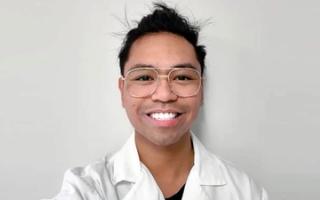
What Does an Oral Health Therapist Do?
What Does an Oral Health Therapist Do?
What Does an Oral Health Therapist Do? Apple Dental’s Jesse Labuguen Explains!
By supporting the dentist, providing hygiene and dental treatments, and ensuring patients receive the best quality of care and support, Oral Health Therapists (OHTs) have an important role within a dental practice.
To find out more about what an OHT does and the benefits they bring to the practice, we sat down with Apple Dental’s Jesse Labuguen to talk all things OHT.
Jesse, tell us a bit about what your role as an OHT involves.
I’m an OHT with an Adult Scope Extension, which means in addition to the role that OHT’s fulfil, I’m now able to work with patients of all ages (most OHTs work with children up to the age of 18). My role is a little like being a ‘mini dentist’, as there’s a lot of cross-over between what I do and what a dentist is responsible for.
Essentially, I support the dentist in identifying risk factors in patients. OHTs are taught to take a more preventative approach when it comes to dental issues, so we’ll look at ways to prevent conditions such as gum disease or TMJ (temporomandibular joint) disorders.
In my day-to-day role, I’ll work alongside the dentist, see patients, conduct exams, and support the dentist in diagnosing and addressing oral health conditions.
What benefits does an OHT bring to a dental practice?
I’d say that having an OHT working in a dental practice allows the dentist to focus on more of the ‘heavy’ stuff. I’m able to add to what the dentist recommends and can ‘fill in the gaps’ to ensure nothing’s been overlooked.
It’s a bit like having an extra pair of professional eyes – the dentist and the OHT work as a team to provide the patient with the support and treatment they need.
As an OHT, I’m also able to go beyond dentistry options when it comes to recommending the best course of action for a patient. For example, if a patient is suffering from a condition like TMJ disorder, my background allows me to point them to allied health options such as a physiotherapist or chiropractor in addition to dentistry solutions, so it enables a more holistic approach.
Why did you choose to pursue a career in dentistry and what do you enjoy about it?
My mum was a dentist, so she always encouraged me to consider it as a career option. I had to make a decision between art and dentistry, but I actually see my role as involving quite a lot of creativity, so it’s the best of both worlds.
I enjoy being able to talk to my patients and develop relationships with them. My role allows me to discuss aspects that go beyond dentistry, such as a patient’s daily routines, their lifestyle, and any stress factors which may be impacting their oral health. It’s very broad and I enjoy the connections I develop with patients as a result.
OHTs have a particularly important role when it comes to treating children. Can you tell us a bit about that?
Although I now work with patients of all ages, I have a background in paediatric dentistry/dental therapy. I believe the key is to learn how to read children and make sure they’re being heard – it’s important to take the time to understand the patient and how they’re feeling.
You definitely need to practice greater patience when working with children, as well as being ready to take a creative approach – what works for one kid won’t work for another, so you may need to think outside of the box.
I’d say that dealing with children requires more sensitivity – however, I also think that adults are essentially ‘big kids’! They have their own set of dental phobias, pain, fears etc., so it’s just as important to take a sensitive approach with adult patients.
We’ve covered a lot about what you do at the dental practice, but how about outside of it – do you have any hobbies?
Yes, I’m a very keen photographer (you can see my work on my Instagram page, @jessetides), so this is something I do a lot of in my spare time. I’m also involved with some creative marketing projects outside of work, which allows me to indulge my passion for creativity.
I’d describe myself as a creator at heart, so when I’m not working you can usually find me doing something fun and creative!

